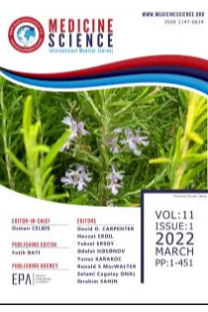Accidental death due to intentionally usage of organophosphate: Report of two cases
Organophosphate, Accidental death, Misuse, Lice
Accidental death due to intentionally usage of organophosphate: Report of two cases
Organophosphate, Accidental death, Misuse, Lice,
___
- Jones AL, Karalliedde L. Poisoning. In: Boon NA, Colledge NR, Walker BR, Hunter JAA, eds, Davidson’s Principles and Practice of Medicine. 20th ed. London: Churchill Livingstone. 2006; 203-26.
- Levot G. Resistance and the control of lice on humans and production animals. Int J Parasitol. 2000;30(3):291-7.
- Leibson T, Lifshitz M. Organophosphate and carbamate poisoning: review of the current literature and summary of clinical and laboratory experience in southern Israel. Isr Med Assoc J. 2008;10(11):767-70.
- van Heel W, Hachimi-Idrissi S. Accidental organophosphate insecticide intoxication in children: a reminder. Int J Emerg Med. 2011;4(1):32.
- Sogut O, Baysal Z, Ozdemir B. Acute pulmonary edema and cardiac failure due to zinc phosphide ingestion. J Emerg Med. 2011;40(6):117-8.
- Levy-Khademi F, Tenenbaum AN, Wexler ID, Amitai Y. Unintentional organophosphate intoxication in children. Pediatr Emerg Care. 2007 Oct;23(10):716-8.
- Recena MC, Caldas ED, Pires DX, Pontes ER. Pesticides exposure in Culturama, Brazil--knowledge, attitudes, and practices. Environ Res. 2006;102(2):230-6.
- Sungur M, Güven M. Intensive care management of organophosphate insecticide poisoning. Crit Care. 2001;5(4):211-5.
- Sadaka Y, Broides A, Tzion RL, Lifshitz M. Organophosphate acetylcholine esterase inhibitor poisoning from a home-made shampoo. J Emerg Trauma Shock. 2011;4(3):433-4.
- El-Naggar Ael-R, Abdalla MS, El-Sebaey AS, Badawy SM. Clinical findings and cholinesterase levels in children of organophosphates and carbamates poisoning. Eur J Pediatr. 2009;168(8):951-6.
- Recena MC, Pires DX, Caldas ED. Acute poisoning with pesticides in the state of Mato Grosso do Sul, Brazil. Sci Total Environ. 2006;357(1-3):88-95.
- ISSN: 2147-0634
- Yayın Aralığı: 4
- Başlangıç: 2012
- Yayıncı: Effect Publishing Agency ( EPA )
Outlet Forceps in Modern Era, a Dangerous Instrument or an Art of Obstetrics?
Accidental death due to intentionally usage of organophosphate: Report of two cases
Doğan M, Celbis O, Ozdemir B, Bozkurt S, Okumus M
Skeletal Muscle, Myokines and Health
QALY; Kaliteye Ayarlı Yaşam Yılları
Şahin Ş, Toprak S, Ünal E, Şelale ŞAHİN, Selime TOPRAK, Erdinç ÜNAL
Nervey DW, Pactrick IS, Godwin AO
Sexual risky behaviours among the youth in Kenya
Magu D, Mutugi M, Wanzala P, Ndahi L, Dennis G. MAGU, Peter W. WANZALA, Marion W. MUTUGİ, L. Peter W. NDAHİ
Laparoscopic surgery for adrenal myelolipoma: Report of two cases
Ates M, Karaca Z, Dirican A, Hatipoglu S Aydin NE, Mustafa ATES, Zuhal KARACA, Abuzer DİRİCAN, Sinan HATİPOGLU, İbrahim SAHİN, N. Engin AYDİN
Kekilli E, Aluçlu MA, Batı F, Köksal İ, Ersoy KEKİLLİ, Mustafa Arif ALUÇLU, Fatih BATI, İsmail KÖKSAL
